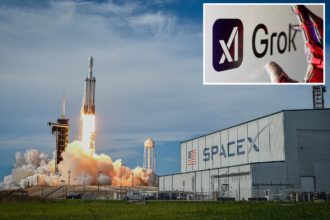Meta Platforms forecast third-quarter revenue well above Wall Street estimates on Wednesday, as artificial intelligence continued to strengthen its core advertising business, sending its shares up 10% in extended trading.
The company also raised the lower end of its capital expenses forecast for the year.
The bumper results could ease investor worries, at least for now, about Meta’s forecast that the year-over-year growth rate in the fourth quarter would be slower than in the third quarter. Investors also shrugged off the company’s comments on rising infrastructure and employee compensation costs, which Meta said would “result in a 2026 year-over-year expense growth rate that is above the 2025 expense growth rate.”
For the third quarter, Meta said it expected total revenue of $47.5 billion to $50.5 billion, compared with analysts’ average estimate of $46.17 billion, according to data compiled by LSEG. Its third-quarter guidance assumed a 1% benefit from a weak dollar, it said in a statement.
Meta expects both total expenses and capital expenditures to increase significantly in 2026, driven primarily by higher infrastructure costs and continued investment to support AI initiatives.
“AI-driven investments into Meta’s advertising business continue to pay off, bolstering its revenue as the company pours billions of dollars into AI ambitions like superintelligence,” said eMarketer senior analyst Minda Smiley. “But Meta’s exorbitant spending on its AI visions will continue to draw questions and scrutiny from investors who are eager to see returns.”
Smiley added that Meta’s strong results signaled that the broader digital advertising market was not yet feeling the pain from tariffs.
U.S. antitrust regulators have sued Meta to force it to restructure or sell Instagram and WhatsApp, claiming the company sought to monopolize the market for social media platforms used to share updates with friends and family. With court papers due in September, the judge overseeing the case is unlikely to rule until later this year at the earliest.
Meta CEO Mark Zuckerberg testified in April that the company was initially slow to recognize the competitive threat of TikTok, and that Meta has over the years tried to build many apps that never gained traction.
Meta said on Wednesday that while it was not providing an outlook for fourth-quarter revenue, the company expected the year-over-year growth rate in the period to be slower than in the third quarter.
The social media giant raised the lower end of its annual capital expenditures forecast by $2 billion, driven by its high-stakes push for “superintelligence” in the heated AI race.
The Facebook and Instagram parent now expects capital expenditures to be between $66 billion and $72 billion.
Training and deploying advanced AI systems remain a capital-intensive endeavor, requiring costly hardware, massive computing resources and top-tier engineering talent.
After a lackluster reception for its Llama 4 model that led to staff departures, Meta has tried to revitalize its AI push by sparking a high-stakes talent war in which it has doled out more than $100 million in pay packages to researchers from rival firms.
Zuckerberg has pledged to spend hundreds of billions of dollars to build massive AI data centers, having shelled out $14.3 billion for a stake in startup Scale AI and poached its 28-year-old billionaire CEO, Alexandr Wang.
To fund the push, the billionaire founder is leaning on Meta’s massive user base as well as AI-powered improvements in content engagement that make it a stable bet for advertisers even in times of economic uncertainty.
The tech giant recently introduced an AI-driven image-to-video ad creation tool under its Advantage+ suite, allowing marketers to generate video ads from static images.
Instagram, whose Reels product competes with ByteDance’s TikTok and YouTube Shorts for ad dollars in the popular short video format, is set to account for more than half of Meta’s ad revenue in the U.S. this year, according to research firm eMarketer.
Meta has also accelerated efforts to monetize its social media platforms WhatsApp and Threads by integrating ads.
The company last month named insider Connor Hayes as head of Threads, a sign it was moving the platform away from Instagram’s shadow after leaning on the photo-sharing app for growth.
Meta reported record revenue of $47.52 billion for the quarter ended June 30, which surpassed analysts’ average estimate of $44.80 billion, according to LSEG data.
Its profit per share of $7.14 for the second quarter also exceeded estimates of $5.92.










